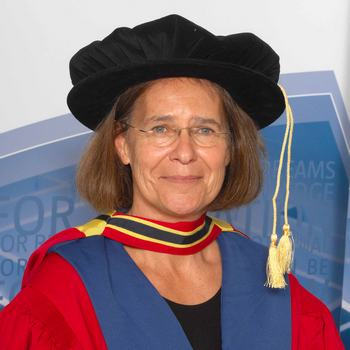DOCTOR OF LITERATURE (HONORIS CAUSA)
 Anna Elizabeth (Antjie) Krog, was born in Kroonstad on 23 October 1952 and grew up on the farm Middenspruit. After completing her high school career in Kroonstad in 1970, she graduated from the University of the Orange Free State with a BA and BA Honours. She also holds a teacher's diploma from UNISA and an MA in Afrikaans literature from the University of Pretoria.
Anna Elizabeth (Antjie) Krog, was born in Kroonstad on 23 October 1952 and grew up on the farm Middenspruit. After completing her high school career in Kroonstad in 1970, she graduated from the University of the Orange Free State with a BA and BA Honours. She also holds a teacher's diploma from UNISA and an MA in Afrikaans literature from the University of Pretoria.
Krog hails from a family with a strong literary tradition (her mother, Dot Serfontein, is an established writer of historical and regional novels). Whilst still at school, Krog's poem My land van hoop (“I build myself a land/where skin colour doesn’t count”) created a political furore in conservative circles with its anti-apartheid ideology. In Kroonstad, where she later lived with her husband, the architect John Samuel, and their children, she taught in the township, conducted COSAW (Congress of South African Writers) workshops and became increasingly involved in radical struggle and anti-apartheid politics. Her autobiographical work Relaas van ‘n moord [Account of a murder] in 1995 relates the story of these times. Later in Cape Town, she became the editor of the leftist intellectual journal, Die Suid-Afrikaan.
Krog soon established herself as an important leading poet, with twelve books of poetry to her name as well as translations and reworking of indigenous South African poetry. For her poetry she has won many literary awards, amongst others, the Eugène Marais prize and the Dutch Reina Prinsen-Geerlings prize (both for most promising young writer) as well as the Rapport, RAU and Hertzog prizes. In 1999 a selection of Krog’s poems appeared in translation as Down to my Last Skin which won the FNB award for best South African poetry volume of that year.
In the 1990’s her poetry became increasingly feminist as well as politically engaged - evident in the poignant poetical reflections on the nature of racial identity in Kleur kom nooit alleen nie [Colour never comes alone] in 2000 and in Body bereft [Verweerskrif] in 2006. Antjie Krog often participates in international literary events such as the Poetry International in Rotterdam, the Nacht der Poëzie in Den Haag, and literary events in France, Flanders and the United States.
During the turbulent times of the Truth and Reconciliation Commission Ms Krog worked as a radio journalist, reporting on the TRC's investigations. She won the Pringle award for excellence in journalism for the coverage. For international commentary she received the Foreign Correspondent award for outstanding journalism.
Ms Krog’s most celebrated, and most contentious work, is Country of my Skull (1998), the first book on the work of the TRC, and at the same time a meditation on the effects of violence (recently made into the film In my country). With Country of my Skull translated into most major international languages, Krog gained international renown. The book received numerous national and international prizes, amongst others the Alan Paton, Booksellers and Olive Schreiner 2000 awards. Most prestigiously, she received the Hiroshima Foundation award for Peace and Culture for Country of my Skull and her work on the Truth and Reconciliation Commission. Country of my Skull is widely prescribed at universities in America and Europe as part of the curriculum dealing with writing about the past.
Ms Krog is director of the Institute for Justice and Reconciliation. She delivered keynote speeches at the Zimbabwe Book Fair in 1998 and at the Conference on Women and Violence organised by the World Bank in Washington in 1998. In recent years she has free lanced as a translator, translating Nelson Mandela's autobiography into Afrikaans as Lang pad na vryheid in 2001.
In recognition of her substantial contribution in the field of literature, and towards social transformation in South Africa, it is an honour for NMMU to confer the degree of Doctor of Literature (Honoris Causa) on ANNA ELIZABETH KROG.